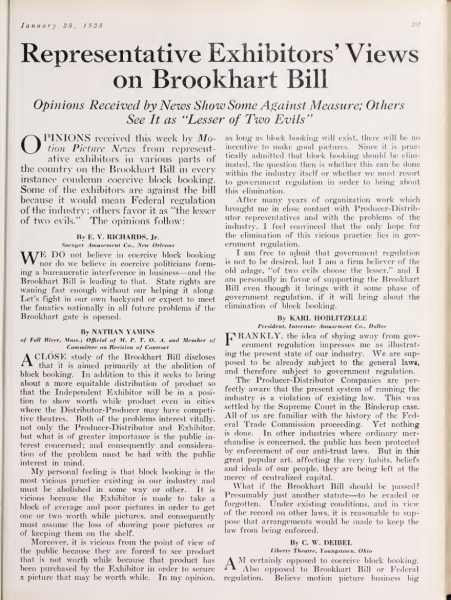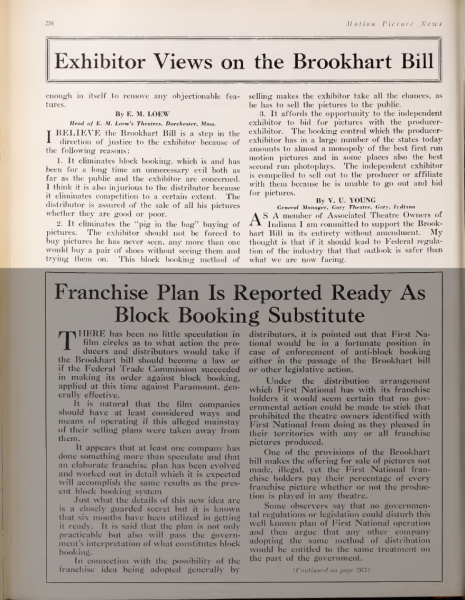Headline: “Representative Exhibitors’ Views on Brookhart Bill”
Subhead: Opinions Received by News Show Some Against Measure; Others See It as “Lesser of Two Evils”
Opinions received this week by Motion Picture News from representative exhibitors in various parts of the country on the Brookhart Bill in every instance condemn coercive block booking. Some of the exhibitors are against the bill because it would mean Federal regulation of the industry; others favor it as “the lesser of two evils.” The opinions follow:
By E. V. Richards, Jr.
Saenger Amusement Co., New Orleans
We do not believe in coercive block booking nor do we believe in coercive politicians forming a bureaucratic interference in business—and the Brookhart Bill is leading to that. State rights are waning fast enough without our helping it along. Let’s fight in our own backyard or expect to meet the fanatics nationally in all future problems if the Brookhart gate is opened.
By Nathan Yamins
of Fall River, Mass.; Official of M. P. T. O. A. and Member of Committee on Revision of Contract
A close study of the Brookhart Bill discloses that it is aimed primarily at the abolition of block booking. In addition to this it seeks to bring about a more equitable distribution of product so that the Independent Exhibitor will be in a position to show worth while product even in cities where the Distributor-Producer may have competitive theatres. Both of the problems interest vitally, not only the Producer-Distributor and Exhibitor, but what is of greater importance is the public interest concerned; and consequently and consideration of the problem must be had with the public interest in mind.
My personal feeling is that block booking is the most vicious practice existing in our industry and must be abolished in some way or other. It is vicious because the Exhibitor is made to take a block of average and poor pictures in order to get one or two worth while pictures, and consequently must assume the loss of showing poor pictures or of keeping them on the shelf.
Moreover, it is vicious from the point of view of the public because they are forced to see product that is not worth while because that product has been purchased by the Exhibitor in order to secure a picture that may be worth while. In my opinion, as long as block booking will exist, there will be no incentive to make good pictures. Since it is practically admitted that block booking should be eliminated, the question then is whether this can be done within the industry itself or whether we must resort to government regulation in order to bring about this elimination.
After many years of organization work which brought me in close contact with Producer-Distributor representatives and with the problems of the industry, I feel convinced that the only hope for the elimination of this vicious practice lies in government regulation.
I am free to admit that government regulation is not to be desired, but I am a firm believer of the old adage, “of two evils choose the lesser,” and I am personally in favor of supporting the Brookhart Bill even though it brings with it some phase of government regulation, if it will bring about the elimination of block booking.
By Karl Hoblitzelle
President, Interstate Amusement Co., Dallas
Frankly, the idea of shying away from government regulation impresses me as illustrating the present state of our industry. We are supposed to be already subject to the general lawg, and therefore subject to government regulation.
The Producer-Distributor Companies are perfectly aware that the present system of running the industry is a violation of existing law. This was settled by the Supreme Court in the Binderup case. All of us are familiar with the history of the Fed- eral Trade Commission proceeding. Yet nothing is done. In other industries where ordinary merchandise is concerned, the public has been protected by enforcement of our anti-trust laws. But in this great popular art, affecting the very habits, beliefs and ideals of our people, they are being left at the mercy of centralized capital.
What if the Brookhart Bill should be passed? Presumably just another statute—to be evaded or forgotten. Under existing conditions, and in view of the record on other laws, it is reasonable to suppose that arrangements would be made to keep the law from being enforced.
By C. W. Deibel
Liberty Theatre, Youngstown, Ohio
Am certainly opposed to coercive block booking. Also opposed to Brookhart Bill or Federal regulation. Believe motion picture business big enough in itself to remove any objectionable features.
By E. M. Loew
Head of E. M. Loew’s Theatres, Dorchester, Mass.
I believe the Brookhart Bill is a step in the direction of justice to the exhibitor because of the following reasons:
1. It eliminates block booking, which is and has been for a long time an unnecessary evil both as far as the public and the exhibitor are concerned. I think it is also injurious to the distributor because it eliminates competition to a certain extent. The distributor is assured of the sale of all his pictures whether they are good or poor.
2. It eliminates the “pig in the bag” buying of pictures. The exhibitor should not be forced to buy pictures he has never seen, any more than one would buy a pair of shoes without seeing them and trying them on. This block booking method of selling makes the exhibitor take all the chances, as he has to sell the pictures to the public.
3. It affords the opportunity to the independent exhibitor to bid for pictures with the producer-exhibitor. The booking control which the producer- exhibitor has in a large number of the states today amounts to almost a monopoly of the best first run motion pictures and in some places also the best second run photoplays. The independent exhibitor is compelled to sell out to the producer or affiliate with them because he is unable to go out and bid for pictures.
By V. U. Young
General Manager, Gary Theatre, Gary, Indiana
As a member of Associated Theatre Owners of Indiana I am committed to support the Brookhart Bill in its entirety without amendment. My thought is that if it should lead to Federal regulation of the industry that that outlook is safer than what we are now facing.

